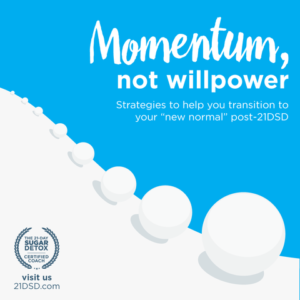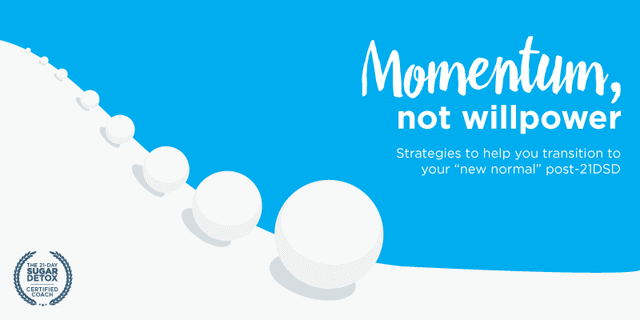Hey Folks! We're excited to welcome Certified 21DSD Coach Katie Leadbetter. Katie's article is part of a series contributed by our Certified 21DSD Coaches. Enjoy! – Diane and Team
During Session Three with one of my 21-Day Sugar Detox clients, the subject of willpower came up. “Katie, I don’t think I have the willpower to maintain this long term. How do I merge back into life after the Detox without veering too far off plan but while also finding a more sustainable plan?” In that conversation, a light bulb went off for me. It’s not willpower that keeps people moving forward, it’s momentum. Read on to learn just what I’m talking about.
Have you ever envied the amount of willpower someone has in the face of a donut, bread, mac’n cheese, or ice cream? I often hear from friends that I have more willpower than they do. I completely disagree. I don't believe I have much willpower at all (you should see how easily I can devour a whole chocolate bar!).
First, humans aren't wired to be able to see a sweet treat (aka a quick source of energy) and simply turn it down. That would not have served us well in our evolutionary past. It's not human nature to turn down food. Today we are faced with more readily available sweet treats than ever before in human history. This is very much an evolutionary mismatch. Furthermore, when we are under-slept, which many of us chronically are, we actually seek out sugary processed foods. If you are tired, why wouldn't you seek out quick sources of energy? See Robb Wolfe's book, Wired to Eat for more.
So then, why am I able to say no to the foods that others can't turn down? The answer is momentum.
Let me provide you with a little context. When I first removed processed foods from my diet in 2011, I tried and failed twice before it stuck. In my job as an elementary school teacher, I noticed that my triggers were the treats in the staff room and the snack that I was handing out to students. So I decided to try a third time during summer vacation. I made sure that at home I would only have access to “yes” foods and that initially, I wouldn’t eat out or eat foods at social gatherings. The third time was the charm for me because I was armed with successes and momentum. I had two months of “practice” under my belt and I was experiencing success: weight loss, less bloating, better moods, stable blood sugar levels, and no more horrible stomachaches. I knew what I was doing was working. When I went back to work in August, I already had enough momentum going that saying no to all the treats in the staff room was easy.
Having the momentum is key. It's the snowball effect.
That momentum just keeps growing and building until staying on your plan is actually easy. Here are several strategies that look like willpower but are simply other tools in my toolbox that help the momentum snowball continue to grow.
 Knowing how you’re going to respond when someone asks if you’re going to have a ______. Practice it. Own it. Stay firm. Having practice with how you are going to respond helps to build your momentum.
Knowing how you’re going to respond when someone asks if you’re going to have a ______. Practice it. Own it. Stay firm. Having practice with how you are going to respond helps to build your momentum.- Having practice navigating holidays, parties, and dining out increases your momentum significantly. These types of situations are often the hardest. The more times you’ve experienced deciding what you can eat at a restaurant, declining food at a party, or ordering a non-alcoholic drink when you’re out with friends, the easier it gets.
- Have your goals written out and posted prominently. Keeping your “why” on your mind will help you to make the choices that support your goals. Perhaps make your goals the home screen photo on your phone?!? You'll surely see them often!
- Write out your successes because they help the momentum snowball to gain momentum. Again, put them someplace you’ll see them. Make sure you have room to add to the list as your successes continue to grow.
- Pay attention to your body and how foods make you feel. Having a food journal can help. If you know when you eat the bagel you feel really sleepy or when you have dairy you breakout the next day, you have all the data you need from your body to know that those foods don't work well for you.
- It can take a while for your taste buds to change, but once they do change, the processed foods lose much of their appeal. Real food is satisfying and nourishing and when you feel satisfied with your meal, you’re much less likely to be tempted by foods that are “no” foods.
Are you a moderator or an abstainer?
Knowing that I'm an abstainer makes it easier for me to stay on track. I do better when I have ZERO processed sugar as opposed to just a little because I can't actually have just a little processed sugar. This idea may sound crazy, but there are many abstainers out there trying to live as moderators and aren’t finding success. Check out this article from Gretchen Rubin to help you decide if you’re a moderator or an abstainer.
Personally, I have some hard no's. Gluten is a never food for me. Because I'm an abstainer, it makes it easy to say no to foods with gluten. Maybe you have some hard no's too that can help support your momentum.
I can’t tell you how many times I’ve turned down dessert at a gathering only to go home and eat a Not-Sweet Treat. I have a rule for myself while on the detox and afterwards: I can have dessert if I make it. This allows me to know the quality of the ingredients and allows me to avoid having to compromise about certain ingredients that I don’t tolerate well.
So the next time you catch yourself thinking about how you wish you had more willpower, challenge yourself to view it as needing more momentum and more practice and then resolve to give yourself more opportunities to practice sticking with your plan.
Do you have any other tools in your momentum toolbox? What keeps you eating real food?
 Katie is enthusiastic about helping people maintain health and vitality through whole-foods based nutrition, customized supplementation, and wellness coaching. Katie is a graduate of Bauman College Holistic Nutrition and Culinary Arts. She is a certified Nutrition Consultant. She is skilled in gluten-free and paleo-centered cuisines. She leads regular monthly 21-Day Sugar Detox groups. As a private Nutrition Consultant, she is focused on working one-on-one with clients to improve their digestion and balance their blood sugar through diet analysis, cooking and shopping instruction, and individualized dietary and nutrient recommendations. Katie has been following a paleo diet and has been gluten-free since 2011. She practices yoga and hikes. She is also a Breast Cancer survivor. She and her husband, Jim, live in Santa Clara, CA, with their dogs Jax and Molly. Katie can be reached at www.cleaneatingwithkatie.com or [email protected].
Katie is enthusiastic about helping people maintain health and vitality through whole-foods based nutrition, customized supplementation, and wellness coaching. Katie is a graduate of Bauman College Holistic Nutrition and Culinary Arts. She is a certified Nutrition Consultant. She is skilled in gluten-free and paleo-centered cuisines. She leads regular monthly 21-Day Sugar Detox groups. As a private Nutrition Consultant, she is focused on working one-on-one with clients to improve their digestion and balance their blood sugar through diet analysis, cooking and shopping instruction, and individualized dietary and nutrient recommendations. Katie has been following a paleo diet and has been gluten-free since 2011. She practices yoga and hikes. She is also a Breast Cancer survivor. She and her husband, Jim, live in Santa Clara, CA, with their dogs Jax and Molly. Katie can be reached at www.cleaneatingwithkatie.com or [email protected].


Comments 5
Je commence le niveau 1 du 21 jours sans sucre! J ai besoin des idées pour le petit déjeuner!
Merci beaucoup! 😃
Looking forward to learning more about being a ‘no’er’.
Looking forward to reading more.
Want to learn more.
Hi Cathie,
We’re so excited for you! We recommend getting started by grabbing the free program rules at 21dsd.com/free, and joining our Facebook Community https://www.facebook.com/groups/21DSDcommunity!
—Moriah, Team 21DSD